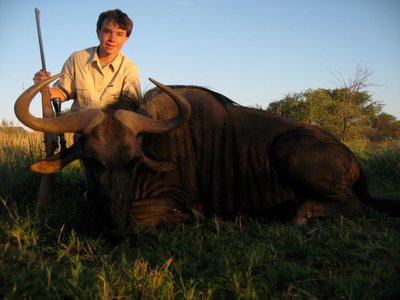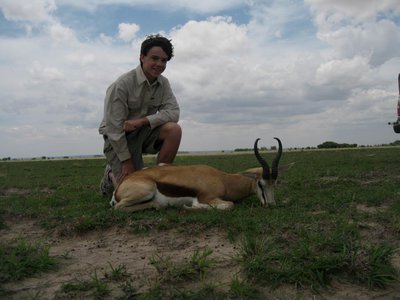I'm not sure why I'm bothering to reply to this, but I am, so here.
Humans have changed our environment. There is no denying that, by anyone. As such, as have effected game populations, both positively and negatively. I am going to use the example of whitetail deer. There are more deer now than at any time in history. How is this possible? Haven't we cut down vast amount of forest? Yes, of course. Drive up into the mountains sometime and take a hike. How many deer did you see? Zero. Now drive back to a rural area. How many deer did you see? Probably many.
We have a significant amount of agriculture, as well as lawns, gardens, etc. Just the roads and their shoulders with all the grass and clover come into play. In essence, we have created a smorgasbord for deer, and have eliminated their predators at the same time. We have a responsibility to manage the population now.
Deer spread disease, especially when they are overpopulated. Did you know that the state of NY has a deer herd of over 1 million? Yes, a million deer in NY. This is an overpopulation, and the Department of Environmental Conservation agrees. They issue licenses for deer, and do so in a very controlled manner. There are DMPs, or Doe Management Permits issued, specific to every area of the state. A population's numbers are not influenced by the number of males, but rather by the number of females.One male can breed hundreds of females, so unless every single male is eliminated it is not doing much for population control.
Sometimes when a severe overpopulation happens, and the carrying capacity for an area is exceeded, the deer suffer greatly. There comes a time when the understory is browsed out, and the deer become thin and hungry. Then a hard winter hits, and these deer slowly die. This is not responsible management. In short, we have created a situation, and it is our responsibility to control it.
What about hunting for invasive species? Nutria in the south are a tremendous problem. Asiatic carp are commonly bowfished for, and are rarely eaten. However, hunters and fishermen are urged to kill carp in as great a number as possible. Carp are herbivores, so what damage do they do? Simple. They eat all of the weeds, algae, and other hiding area where smaller fish and minnow live. Fish lay their eggs in this vegetation, so that their young have a place to hide and not get eaten. Carp will literally eat every bit of vegetation they can find, effectively killing entire populations of native fish. This is merely one example.
Hunters have, in recent times, been the greatest stewards of wildlife that there are.. Banner organizations such as Ducks Unlimited and the National Wild Turkey Federation have been responsible for more conservation in regard to these target species than anyone else. Fifty years ago turkeys were very rare. Due to captive breeding and release programs, as well as land conservation, the wild turkey now lives in 49 of the 50 states, and in great numbers. Ducks Unlimited protects wetlands and migratory routes. It is these sportsmen who feel a connection to their quarry who work so tirelessly to make certain that healthy and huntable populations endure, so that they may continue to do that which they enjoy, and so that one day their children may have the same experiences.
The great majority of game conservation funding in the US comes directly from the sales of hunting licenses. Hunting is a management and conservation tool, not a sport for bloodthirsty killers. There are always bad examples, and plenty of uneducated rednecks out there with questionable ethics. Unfortunately these are the cases that make the news, the yahoo who spotlighted ten deer after he got drunk. The papers list this as a hunter committing a crime, rather than a poacher breaking the law. A hunter is a conservationist, an environmental steward, and a friend to the game he pursues. There is a quote I like: "I do not hunt to have killed, but I kill to have hunted."
































